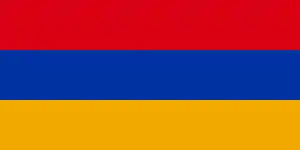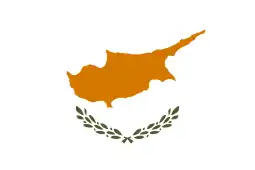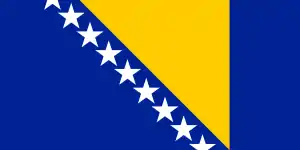Junior Eurovision Song Contest 2008
The Junior Eurovision Song Contest 2008 was the sixth edition of the annual Junior Eurovision Song Contest, which is the world's largest song contest for children.[2] It was held at the "Spyros Kyprianou" Athletic Centre in Lemesos, Cyprus and hosted by Alex Michael and Sophia Paraskeva. It was won by the Georgian trio Bzikebi, with the song "Bzz..". This is the first song to win any Eurovision Song Contest in an imaginary language. Ukraine took 2nd place and Lithuania finished 3rd.[3] Bzikebi also became the first group act to win Junior Eurovision.
| Junior Eurovision Song Contest 2008 | |
|---|---|
| Fun In The Sun | |
 | |
| Dates | |
| Grand final | 22 November 2008 |
| Host | |
| Venue | Spyros Kyprianou Athletic Centre, Limassol, Cyprus |
| Presenter(s) | Alex Michael Sophia Paraskeva |
| Directed by | Klitos Klitou |
| Executive supervisor | Svante Stockselius |
| Executive producer | Munro Forbes |
| Host broadcaster | Cyprus Broadcasting Corporation (CyBC) |
| Opening act | Dance act featuring Yiorgos Ioannides and Mariam Venizelou. |
| Interval act | Dima Bilan, Evridiki & Dimitris Korgialas |
| Reprise act | All participants performing "Hand in Hand" |
| Website | junioreurovision |
| Participants | |
| Number of entries | 15 |
| Debuting countries | None |
| Returning countries | None |
| Non-returning countries | |
Participation map
| |
| Vote | |
| Voting system | Citizens of each participating country vote by telephone and SMS message, which counts for 50%. Each country's 10 favourites are awarded 1 to 8, 10 and 12 points based on the number of votes. Results 1–5 are automatically displayed on-screen, then each country announces 6–8, 10 and 12 points. A jury in each country also has a 50% say in the outcome.[1] |
| Nul points | All countries get 12 points from start |
| Winning song | "Bzz.." |
The theme of the event was "Fun in the Sun",[4] despite the fact that there were thunderstorms in Lemesos the day of the contest. The stage, which was designed by George Papadopoulos,[5] was nominated for the prestigious international "Live Design Excellence Awards".[6] The design is an abstract composition and consists of a round stage representing the island of Cyprus, real water along the front of the stage, two jetties, the waves breaking and moving away from the island and five sailing boats with oars. During the competitive performances, a beach ball with the design of the performer's national flag would be floating in the on-stage pond while they were performing.
For the contest, various changes to the rules were made. One was that adults could assist children to write the songs submitted to their national broadcaster; previously only children could write the songs, with no assistance from adults. Another change was only six people could be on stage during a performance, instead of eight. The most significant change, however, was only half of the vote was decided by the tele-voters. Before the 2008 contest tele-voters completely decided the whole result. The other half of the result was decided by a jury of adults and children.[7][8]
Location
Bidding phase and host selection
On 27 May 2007, the Eurovision Steering Group decided to award CyBC of Cyprus the rights to host the 2008 contest, over bids from TV4 of Sweden and NTU of Ukraine, the latter of which would later host the 2009 edition.
Venue

The Spyros Kyprianou Athletic Center[9] (Greek: Αθλητικό Κέντρο "Σπύρος Κυπριανού"), also known as Palais des sports, is the biggest and the most imposing multi dynamic indoor athletic arena in Cyprus. It is named after the late president of Cyprus Spyros Kyprianou. This project was conducted by the Cyprus Sports Organisation and was constructed north of the city of Limassol near Kato Polemidia and by the side of Limassol - Troodos road. Construction of the project began in late 2002 and was completed at the end of 2005 at a total cost of approximately CY£8.5 million.
Format
On 10 September 2008, the hosts were announced as Alex Michael and Sophia Paraskeva; both presenters with Cypriot backgrounds.[10]
On 13 October 2008, the draw of the running order took place live on CyBC 1. This involved drawing the first and last countries and performers, and then drawing countries into various 'pots' to decide when they would perform.[11] The full running order was announced on 14 October 2008.[12] The stage was constructed between 30 October 2008 and 14 November 2008.
Voting
As in all previous Eurovision Song Contests each country gave their top 10 countries songs points from 1 point for their 10th favourite song up until 8 points for their 3rd favourite song. Then 10 and 12 points were given for the second favorite and favorite respectively. But, the difference between this contest and other past contests is this is the first Eurovision Song Contest that implements a jury vote that counts for half of each countries vote.[13]
Participating countries
Fifteen countries took part in the 2008 Junior Eurovision Song Contest: Armenia, Belarus, Belgium, Bulgaria, Cyprus, Macedonia, Georgia, Greece, Lithuania, Malta, Netherlands, Romania, Russia, Serbia, and Ukraine.[14] Portugal, which had taken part twice since 2006 announced that it was no longer interested in the contest and withdrew along with Sweden, a founding country in 2003, which left because of other broadcasting plans during the time of the event.[15][16] Portugal would return in 2017 after winning the adult contest for the first time that same year.[17]
On the other hand, Israel and Bosnia and Herzegovina announced their intention to participate, but decided both to withdraw before the contest. Welsh language broadcaster S4C considered the possibility of participation, but in the end it was decided they would not to participate in the competition, because their debut was rejected because Wales isn't a sovereign state. Only the BBC has the exclusive right to represent the United Kingdom.[18] Wales later debuted in the 2018 contest.
Azerbaijan announced its intention to take part also, but withdrew from the contest in early October. According to İctimai Televiziya və Radio Yayımları Şirkəti, the network was unable to select and prepare children for such a high scale event without proper help from other governmental structures and bodies. The broadcaster also confirmed payment of a fine to the EBU due to its late withdrawal.[19] Poland had also considered participation but decided that it would not take part this year.[20] The 2008 contest was the first Junior Eurovision Song Contest to have no debuting countries.
Final
For the first time, each country decided their votes through a 50% jury and 50% televoting system which decided their top ten songs. The only country that did not use this system was Ukraine who calculated their vote using a jury. Ukrainian broadcaster NTU opted not to broadcast the contest live, but to air it deferred on Sunday 23 November as Saturday 22 November was Holodomor Remembrance Day in the country.[21]
| Draw | Country | Artist | Song | Language | Place | Points |
|---|---|---|---|---|---|---|
| 01 | Mădălina and Andrada | "Salvați planeta!" | Romanian | 9 | 58 | |
| 02 | Monica | "Im Ergi Hnchyune" (Իմ Երգի Հնչյունե) | Armenian | 8 | 59 | |
| 03 | Dasha, Alina & Karyna | "Serdtse Belarusi" (Сердце Беларуси) | Russian, Belarusian[22] | 6 | 86 | |
| 04 | Mihail Puntov | "Spit angel" (Спит ангел) | Russian | 7 | 73 | |
| 05 | Niki Yiannouchu | "Kapoia nychta" (Καποια νύχτα) | Greek | 14 | 19 | |
| 06 | Bzikebi | "Bzz.." | Imaginary | 1 | 154 | |
| 07 | Oliver | "Shut Up" | Dutch | 11 | 45 | |
| 08 | Krastyana Krasteva | "Edna mechta" (Една мечта) | Bulgarian | 15 | 15 | |
| 09 | Maja Mazić | "Uvek kad u nebo pogledam" (Увек кaд у небо погледaм) | Serbian | 12 | 37 | |
| 10 | Daniel Testa | "Junior Swing" | English | 4 | 100 | |
| 11 | Marissa | "1 dag" | Dutch | 13 | 27 | |
| 12 | Viktoria Petryk | "Matrosy" (Матроси) | Ukrainian | 2 | 135 | |
| 13 | Eglė Jurgaitytė | "Laiminga diena" | Lithuanian | 3 | 103 | |
| 14 | Bobi Andonov | "Prati mi SMS" (Прати ми СМС) | Macedonian | 5 | 93 | |
| 15 | Elena Mannouri and Charis Savva | "Gioupi gia!" (Γιούπι για!) | Greek | 10 | 46 | |
International broadcasts and voting
Voting and spokespersons
 Romania – Iulia Ciobanu (Co-host of the Romanian national final in 2007 and 2008)
Romania – Iulia Ciobanu (Co-host of the Romanian national final in 2007 and 2008) Armenia – Mary Sahakyan
Armenia – Mary Sahakyan.svg.png.webp) Belarus – Anjelica Misevich
Belarus – Anjelica Misevich Russia – Sarina
Russia – Sarina Greece – Stefani Trepekli
Greece – Stefani Trepekli Georgia – Ana Davitaia
Georgia – Ana Davitaia.svg.png.webp) Belgium – Chloé Ditlefsen
Belgium – Chloé Ditlefsen Bulgaria – Marina Baltadzi
Bulgaria – Marina Baltadzi.svg.png.webp) Serbia – Anđelija Erić
Serbia – Anđelija Erić Malta – Francesca Zarb
Malta – Francesca Zarb Netherlands – Famke Rauch
Netherlands – Famke Rauch Ukraine – Marietta
Ukraine – Marietta Lithuania – Lina Joy (Lithuanian representative in 2007)
Lithuania – Lina Joy (Lithuanian representative in 2007) Macedonia – Marija Zafirovska
Macedonia – Marija Zafirovska Cyprus – Christina Christofi
Cyprus – Christina Christofi
Participating countries
 Armenia – Gohar Gasparyan (Armenia 1)
Armenia – Gohar Gasparyan (Armenia 1).svg.png.webp) Belarus – Denis Kurian (Belarus 1)
Belarus – Denis Kurian (Belarus 1).svg.png.webp) Belgium – Kristien Maes and Ben Roelants (VRT)
Belgium – Kristien Maes and Ben Roelants (VRT) Bulgaria – Elena Rosberg and Georgi Kushvaliev (BNT 1)
Bulgaria – Elena Rosberg and Georgi Kushvaliev (BNT 1) Cyprus – Kyriakos Pastides (CyBC)
Cyprus – Kyriakos Pastides (CyBC) Georgia – Temo Kvirkvelia (GPB)
Georgia – Temo Kvirkvelia (GPB) Greece – Renia Tsitsibikou and George Amyras (ERT)
Greece – Renia Tsitsibikou and George Amyras (ERT) Lithuania – Darius Užkuraitis (LRT)
Lithuania – Darius Užkuraitis (LRT) Macedonia – Ivona Bogoevska (MTV 1)
Macedonia – Ivona Bogoevska (MTV 1) Malta – Valerie Vella (TVM)
Malta – Valerie Vella (TVM) Netherlands – Sipke Jan Bousema (AVRO)
Netherlands – Sipke Jan Bousema (AVRO) Romania – Ioana Isopescu and Alexandru Nagy (TVR)
Romania – Ioana Isopescu and Alexandru Nagy (TVR) Russia – Olga Shelest (RTR)
Russia – Olga Shelest (RTR).svg.png.webp) Serbia – Duška Vučinić-Lučić (RTS2)
Serbia – Duška Vučinić-Lučić (RTS2) Ukraine – Timur Miroshnychenko (NTU)
Ukraine – Timur Miroshnychenko (NTU)
Non-participating countries
A live broadcast of the Junior Eurovision Song Contest was available worldwide via satellite through European streams such as TVRi, ERT World, ARMTV, RTS Sat and MKTV Sat. The official Eurovision Song Contest website also provided a live stream without commentary via the peer to peer medium Octoshape.
.svg.png.webp) Australia: Australia broadcast the contest on 13 May 2009, as a lead up to the 2009 Eurovision Song Contest.[23]
Australia: Australia broadcast the contest on 13 May 2009, as a lead up to the 2009 Eurovision Song Contest.[23] Azerbaijan: Azerbaijan was originally going to participate but withdrew on 15 October 2008. The contest was broadcast on İctimai TV.
Azerbaijan: Azerbaijan was originally going to participate but withdrew on 15 October 2008. The contest was broadcast on İctimai TV. Bosnia and Herzegovina: Bosnia and Herzegovina were also set to participate but later withdrew. They broadcast the contest on BHRT.
Bosnia and Herzegovina: Bosnia and Herzegovina were also set to participate but later withdrew. They broadcast the contest on BHRT.
Score sheet

| Voting procedure used: 50% jury and televote 100% jury vote |
Results | ||||||||||||||||
|---|---|---|---|---|---|---|---|---|---|---|---|---|---|---|---|---|---|
| Romania | 58 | 4 | 2 | 2 | 2 | 2 | 2 | 1 | 5 | 3 | 2 | 4 | 1 | 8 | 8 | ||
| Armenia | 59 | 3 | 5 | 6 | 6 | 8 | 6 | 7 | 3 | 3 | |||||||
| Belarus | 86 | 5 | 5 | 10 | 4 | 10 | 6 | 7 | 7 | 4 | 5 | 3 | 5 | 3 | |||
| Russia | 73 | 10 | 12 | 3 | 5 | 2 | 2 | 6 | 1 | 7 | 8 | 1 | 4 | ||||
| Greece | 19 | 7 | |||||||||||||||
| Georgia | 154 | 6 | 12 | 8 | 12 | 10 | 12 | 12 | 10 | 8 | 12 | 12 | 12 | 4 | 12 | ||
| Belgium | 45 | 2 | 2 | 1 | 1 | 4 | 3 | 2 | 10 | 2 | 4 | 2 | |||||
| Bulgaria | 15 | 3 | |||||||||||||||
| Serbia | 37 | 1 | 1 | 3 | 6 | 1 | 1 | 12 | |||||||||
| Malta | 100 | 7 | 7 | 4 | 5 | 7 | 7 | 7 | 8 | 1 | 6 | 10 | 7 | 6 | 6 | ||
| Netherlands | 27 | 3 | 5 | 1 | 5 | 1 | |||||||||||
| Ukraine | 135 | 12 | 8 | 10 | 8 | 8 | 12 | 3 | 10 | 6 | 12 | 7 | 10 | 7 | 10 | ||
| Lithuania | 103 | 8 | 6 | 7 | 1 | 10 | 8 | 3 | 12 | 10 | 8 | 6 | 10 | 2 | |||
| Macedonia | 93 | 10 | 6 | 7 | 4 | 5 | 3 | 4 | 5 | 8 | 5 | 5 | 8 | 6 | 5 | ||
| Cyprus | 46 | 4 | 3 | 12 | 1 | 4 | 4 | 4 | 2 | ||||||||
| The table is ordered by appearance. All countries automatically received 12 points. Georgia and Macedonia awarded their points last due to technical problems | |||||||||||||||||
12 points
Below is a summary of all 12 points received:
| N. | Contestant | Voting nation |
|---|---|---|
| 8 | Georgia | Armenia, Belgium, Bulgaria, Cyprus, Lithuania, Netherlands, Russia, Ukraine |
| 3 | Ukraine | Georgia, Malta, Romania |
| 1 | Lithuania | Serbia |
| Russia | Belarus | |
| Cyprus | Greece | |
| Serbia | Macedonia |
- All countries were given 12 points at the start of voting. This was so no country got nul points.
Official album
| Junior Eurovision Song Contest 2008 | ||||
|---|---|---|---|---|
 | ||||
| Compilation album by | ||||
| Released | 10 October 2008 | |||
| Genre | Pop | |||
| Length |
| |||
| Label | Universal | |||
| Junior Eurovision Song Contest chronology | ||||
| ||||
Junior Eurovision Song Contest 2008, is a compilation album put together by the European Broadcasting Union, and was released by Universal Music Group on 10 October 2008. The album features all the songs from the 2008 contest, along with karaoke versions.[24]
References
- "Junior Eurovision Song Contest 2008". Junioreurovision.tv. Retrieved 2013-10-23.
- Quoted from the hosts
- "CONGRATULATIONS GEORGIA!". junioreurovision.tv. Retrieved 2013-10-23.
- "Get to know the venue, Spiros Kiprianou, Palais Des Sports". Oikotimes.com. Archived from the original on 2012-03-29. Retrieved 2013-10-23.
- BDigital Web Solutions. "Scenery and sets design and construction". Skinotechniki.com. Retrieved 2012-08-12.
- "Junior Eurovision Song Contest 2008". Livedesignonline.com. 2010-03-23. Archived from the original on 2012-07-22. Retrieved 2012-08-12.
- "Changes to Junior Eurovision confirmed". oikotimes.com. Archived from the original on 2012-03-29. Retrieved 2013-10-23.
- "Junior: Minor format changes introduced". Eurovision.tv. Retrieved 2013-10-23.
- Niculita, Alexandru. "Palais des Sports". www.limassolmunicipal.com.cy. Retrieved 11 August 2017.
- "Meet the hosts: Sophia and Alex!". junioreurovision.tv. European Broadcasting Union. 10 September 2008. Retrieved 11 August 2017.
- "First part of draw concluded!". junioreurovision.tv. European Broadcasting Union. 13 October 2008. Retrieved 11 August 2017.
- "We have it: The starting order!". junioreurovision.tv. European Broadcasting Union. 14 October 2008. Retrieved 11 August 2017.
- "Junior: Minor format changes introduced | Junior Eurovision Song Contest | Junior Eurovision Song Contest - Kyiv 2013". Junioreurovision.tv. Retrieved 2013-10-23.
- "Participants of Junior Eurovision Song Contest 2008". JuniorEurovision.tv. Archived from the original on 2008-10-03. Retrieved 2013-10-23.
- "RTP withdraw from Junior Eurovision 2008". Archived from the original on December 6, 2008. Retrieved May 28, 2008.
- "Details on Swedish withdrawal". ESCKaz.com. Retrieved 2013-10-23.
- Jordan, Paul (9 August 2017). "16 Countries to dazzle on stage in Tbilisi in 2017!". junioreurovision.tv. European Broadcasting Union. Retrieved 11 August 2017.
- "Junior Eurovision Song Contest 2008 info page". ESCKaz.com. Retrieved 2013-10-23.
- "Детское Евровидение 2008 Кипр Новости Junior Eurovision 2008 Cyprus News". Esckaz.com. 2008-11-14. Retrieved 2013-10-23.
- "Details on Poland non participation". oikotimes.com. Archived from the original on 2012-02-17. Retrieved 2013-10-23.
- "Ukraine not broadcasting contest live". ESCKaz.com. Retrieved 2013-10-23.
- At the start of the song, the backing vocals are in Belarusian.
- "SBS Schedule 13 May 2009". SBS.com.au. Retrieved 2013-10-23.
- "Junior Eurovision Song Contest 2008". itunes.apple.com. 23 November 2015. Retrieved 23 November 2015.

